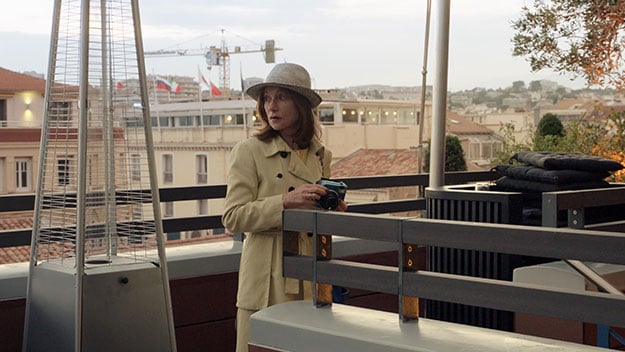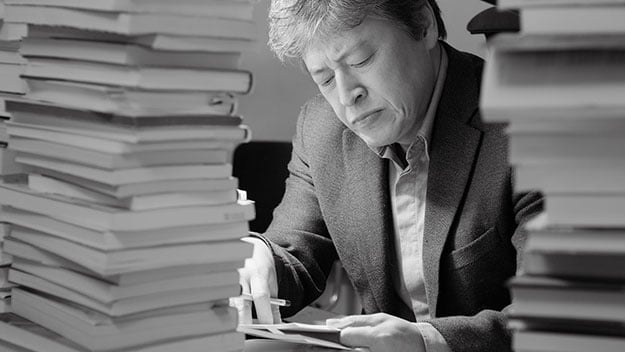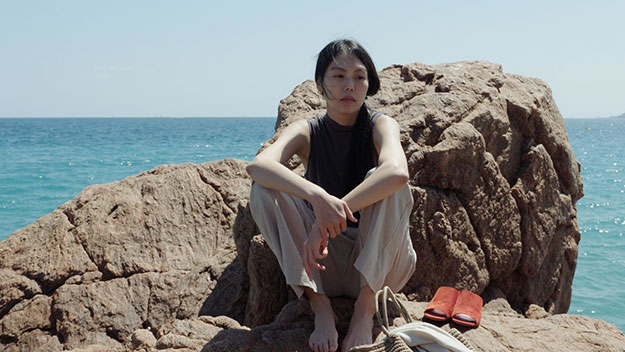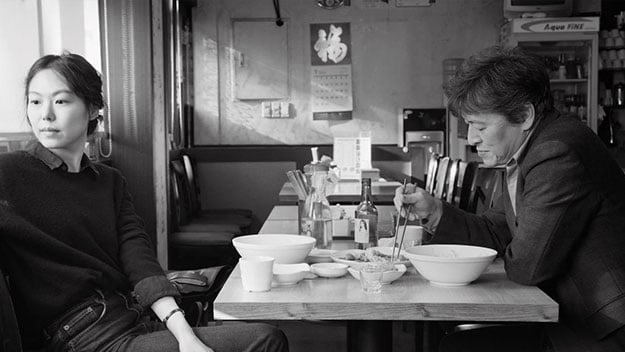Interview: Hong Sangsoo
With three new films premiering in the first half of 2017 alone, the ever-prolific South Korean auteur Hong Sangsoo is currently enjoying the most fruitful period of his career. Following the Berlin bow of his nineteenth feature, On the Beach at Night Alone, Hong brought two more films to the 70th Cannes Film Festival: the playful featurette Claire's Camera (which screened out of competition) and the more sober-minded, if no less humorous, competition entry The Day After. Along with a subtly matured perspective, Hong's increasing interest in female-centered stories has inaugurated a more openly emotional, self-reflexive phase in his career.
Both the deceptively breezy Claire's Camera and the morally inquisitive The Day After continue to pursue the filmmaker's pet themes of desire and duplicity through comedic variations in tone and structure. In Claire's Camera, which was shot on the streets of Cannes during the 2016 edition, a precocious film sales assistant (Kim Minhee) befriends a wayward music teacher (Isabelle Huppert, star of Hong's 2012 film In Another Country) after getting fired by her boss for sketchy reasons that only become clear later. The Day After, shot in sharply contrasted black and white, concerns a trio of women (Kim, Cho Yunhee, and Kim Saebyuk) whose personal and professional entanglements with a bemused book publisher (Kwon Haehyo) are quickly confused and conflated in a series of pleasingly awkward encounters and recriminations. As with On the Beach, each centers on that age-old maxim about mixing business and pleasure, creating volatility that's only helped along in typical Hong fashion by copious amounts of alcohol. (On the Beach at Night Alone was largely read as a dramatic transposition of Hong's real-life romantic involvement with its lead actress, Kim, who played a frequently inebriated actress decamped in Hamburg following a well publicized affair with her director.)
Following a series of rescheduled sit-downs—which, naturally, were to be held at a wine bar high atop the Palais—and a chain of increasingly comic communication breakdowns resembling the situational absurdity of one of the director's own scripted scenarios, Hong corresponded with Film Comment, in quintessentially direct yet oblique fashion, about how the spontaneity of the moment fuels his creativity, eliciting truths more honest than any autobiography.

Claire's Camera
The rumor was that you seemed to shoot Claire's Camera on a whim while in Cannes last year. In reality, it must have been more planned out than that… Tell me about the act of creation and inspiration itself.
I choose a few locations and usually two or three actors without knowing how I will use them. I then have two or three informal interviews with the actors and begin shooting with a few pages of notes, of which I'm not sure any will be used. Other locations and actors are then chosen, if necessary, as I move along, and I proceed to write each day's script each morning, usually starting at 4 a.m. That takes about four to five hours, and I'll then print out the script and let the actors memorize the first scene. I write usually three to five scenes for the average day of shooting, and finish shooting those scenes that day.
The initial editing finishes within a day or two after the final day of shooting. Then I'll let it simmer for about a week or two, and look at it again and sometimes do some minor changes. The preproduction takes about a month; the production about three weeks or less; the postproduction about a month.
For Claire's Camera, there were almost no notes before, but I decided to let the actors know their characters' professions before shooting, for their own sake, and asked the foreign sales company, Finecut, if I could use their booth at Cannes, in case I needed it during production. When I arrived at Cannes two days before the shooting, I found the tunnels on the beach and other locations which I used in the film. It took nine days of shooting, and I finished the initial editing within a day after the final shooting.
I heard that you've referred to Claire's Camera as a children's film, which I find strangely appropriate. Can you expand on that?
I said something like that, but I'm sure I said it without thinking too much about it. As always, the film is about as you see, as you are.
Claire puts forth an intriguing notion: the subject of a photograph changes after being photographed. So many of your films are about perspective, about how people see other people, and how they react as a result. It seems as if you hope this could extend to the viewer as well: do you find men and women reacting differently to your work, or differences between the reactions of English-speaking audiences, French audiences, Korean audiences, etc.?
Yes, they seem to react differently. I guess I mean to make a film that welcomes those diverse reactions. Even The Day After: some say it's very tragic, while others say it's humorous and funny. Each person, while traveling inside of the film, picks up different pieces and comes out trying to make a sense of those pieces. I think that's natural and most beneficial.

The Day After
The three films you've premiered this year all feature, by your standards, somewhat straightforward narratives, but this follows a run of films with bifurcated or more conceptual structures. Are you purposely moving away from these kinds of narratives?
No purpose that I'm conscious of. I'm a person who only responds to "what is given" (at least in important choices), and the "what is given" should be intrinsically something that I cannot know why and how it comes.
I'm curious if you see these three films as at all connected? They seem to share a theme of "business and pleasure."
I'm sure they're all connected, in a sense that they all came out of me.
Despite the parallels between your films and your own life and perceived personality, I hesitate to read your work as being too directly autobiographical. And yet you seem to be encouraging such responses. In Claire's Camera, the director, played by Jung Jinyoung, looks like you, and his character in the film is named So Wansoo. You seem at the very least to be having fun with people's tendencies to look for autobiographical details in your films.
All my films are autobiographical in a sense that whatever I do, they all end up showing something of myself; all my films are not autobiographical in a sense that I've never meant to make a film that represents my life or a part of my life.
You tend to work with the same actors over and over. Are you writing for specific actors at this point? And if you do bring in someone new, how and when do you know if they're appropriate for your sensibilities?
When I first meet them for casting, I see them as persons, not as actors. The meeting usually makes me recall some memories from my life. Certain situations, relationships, dilemmas, etc., are embedded in those memories. If these evocations are strong enough and if they're sincere enough about the work, then I ask them to work with me.
Have you ever encountered a situation on set where these instincts about an actor were wrong, to the point where you didn't think you could work with them as you'd initially hoped?
Two times, both a long time ago. For one person, I needed to stop for a few days in the middle of shooting to have a kind of a quick training for her; for the other one, I needed to talk very seriously about his attitude at work for some hours.

Claire's Camera
With Claire's Camera and On the Beach at Night Alone, is spontaneity part of the appeal of shooting in other countries, i.e., not knowing how the environment will affect the scenarios and the actors?
What I do when I really, truly believe that I don't know tends to result in work that is okay for the sensitivities of some people, including myself.
Your work over the last five or six years seems to have taken more interest in female characters than your previous work, and your recent films with Kim Minhee feel like a culmination of those interests. Was there something that prompted this turn, or has it been intuitive?
If that change actually took place, I don't know why and how it took place and I don't want to analyze. Analysis is a process that takes place only on the thin line of its own language, regardless of what everything is.
Do you feel your work is becoming more openly emotional?
Yes, it seems so.
Do you seek or find catharsis through filmmaking?
During the period of shooting and in the vicinity of shooting, I seem to encounter strange and lucky occurrences quite often. Now they have become the signs that show I'm working in the right attitude, and they also seem to be the force that creates the direction of the film. This kind of experience is so rare in my everyday life that I've come to cherish the experience of filmmaking as something extraordinary.
You've increasingly come to utilize zooms in your films, rather than crosscutting or breaking up dialogue scenes. Is this a purely functional decision? What is it about zooms that interests you?
They're functional, but when they function well, I guess they become something else.

The Day After
Most of your films have fairly fun, lighthearted scores. But the music in The Day After is very discordant. How did you decide on the aural character of the film?
When I met the real owner of the small publishing company that I used in the film, he told me he comes out of his apartment every day before dawn to go to the office. I said I wanted to follow his route from the house to the office. I did. And when I did, I kind of realized the film would have some somber aspect.
And that presumably played into the decision to again shoot in black and white? Are you making these technical and formal decisions as you film, based on the spontaneity of the moment?
Yes, I guess black and white was conceived in following that realization. I believe if the moment is better appreciated as it is, then it might reveal the glimpse of everything.
Jordan Cronk is a critic and programmer based in Los Angeles. He runs the experimental screening series Acropolis Cinema and is co-artistic director of the Locarno in Los Angeles Film Festival.

-In the absence of greatness, mediocrity thrives.
http://www.cafeafricana.com
On Twitter: @Bookwormlit
Culture, Art History, Film/Cinema, Photography, World Literature, Criminal Justice, Sociology, Child Welfare, Lifestyle & Community.
Listserv moderated by Toyin Falola, University of Texas at Austin
To post to this group, send an email to USAAfricaDialogue@googlegroups.com
To subscribe to this group, send an email to USAAfricaDialogue+subscribe@googlegroups.com
Current archives at http://groups.google.com/group/USAAfricaDialogue
Early archives at http://www.utexas.edu/conferences/africa/ads/index.html
---
You received this message because you are subscribed to the Google Groups "USA Africa Dialogue Series" group.
To unsubscribe from this group and stop receiving emails from it, send an email to usaafricadialogue+unsubscribe@googlegroups.com.
For more options, visit https://groups.google.com/d/optout.
No comments:
Post a Comment